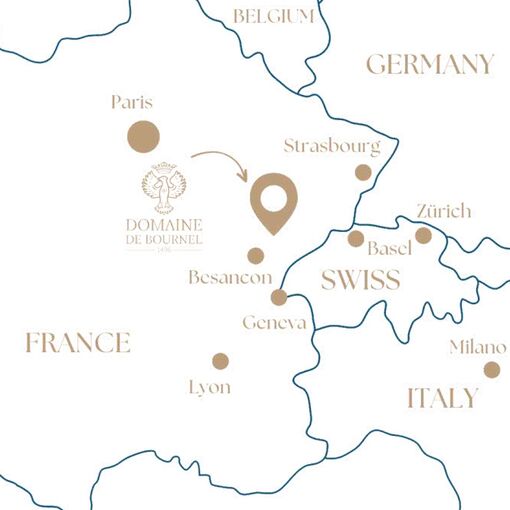
Qiese & Sonja

Qiese & Sonja
How To Get There
Arrival Dates & Events
Friday, June 27: Welcome Dinner at the Château
Saturday, June 28: Wedding Ceremony & Reception
Sunday, June 29: Farewell Brunch at the Château
Best Ways To Get There
Due to its close proximity to the Swiss border, the most convenient routes to Château de Bournel are through Paris, France, or Basel, Switzerland.

Via Paris
Paris Airports:
Paris Charles de Gaulle (CDG)
Paris Orly (ORY)
From either airport, you have two options to get to the Château:
Option 1: take a train to a nearby town, then rent a car or taxi from there to the Château (1.5-2 hour train ride + 35-60 minute car ride).
Option 2: rent a car at the Paris airport and drive directly to the Château (~4 hours).
Option 1A: Paris to the Château via Besançon train station
Step 1: Paris → Besançon Franche-Comté TGV Station
Departure Station: Typically Paris Gare de Lyon
Arrival Station: Besançon Franche-Comté TGV (not “Besançon Viotte”)
Travel Time: ~2 hours
Tickets: Purchase on the SNCF Connect website or at train station ticket counters.
Booking Tip: Reserve as early as possible for the best fares and seat availability. Bookings typically open 3 months before travel date.
Step 2: Besançon Franche-Comté TGV → Château de Bournel
By Taxi: ~45 minutes (50 km)
Advance Booking recommended to avoid waiting.
By Rental Car:
Major rental companies (Hertz, Avis, Europcar) have offices at the Besançon Franche-Comté TGV station.
Drive time: ~45 minutes to the Château
Option 1B: Paris to the Château via Dijon Train Station
Step 1: Paris → Dijon Ville Station
Departure Station: Typically Paris Gare de Lyon
Arrival Station: Gare de Dijon-Ville (sometimes simply listed as Dijon)
Travel Time: ~1 hour 35 minutes
Tickets: Purchase on the SNCF website or at train station ticket counters.
Booking Tip: Reserve as early as possible for the best fares and seat availability. Bookings typically open 3 months before travel date.
Step 2: Dijon → Château de Bournel
By Taxi: ~1 hour 30 minutes (100 km)
Advance Booking recommended to avoid waiting.
By Rental Car:
Major rental companies (Hertz, Avis, Europcar) have offices at the Dijon train station.
Drive time: ~1 hour 30 minutes to the Château
Option 2: Paris to the Château via rental car
Why Drive? Flexibility to explore the countryside, perfect for groups to share costs.
Driving Time: ~4 hours from central Paris (traffic dependent)
Suggested Driving Route
Paris → A6 motorway (southbound)
A6 → A36 motorway (toward Besançon/Mulhouse)
Near Baume-les-Dames, exit toward Rougemont/Cubry
Follow local D roads to Cubry
Use GPS or signs for Château de Bournel
Car Rentals available at the airport (Hertz, Avis, Europcar, etc.)
Ample on-site parking at the Château (no charge).
Additional Tips
Tolls: Be prepared for toll roads (péages) on the A6 and A36.
Navigation: Using a GPS or a reliable map application is recommended for real-time traffic updates and precise directions.
Fuel: Ensure your vehicle has sufficient fuel, as service stations may be sparse in rural areas.
Via Basel
Basel Airport:
EuroAirport Basel-Mulhouse-Freiburg (BSL)
The BSL airport is located on the French-Swiss-German border and is often less crowded than Paris airports.
Basel to the Château via rental car
Driving Time: ~1.5–2 hours (135 km)
Suggested Driving Route
Basel Airport → A35 motorway towards Mulhouse
A35 → A36 motorway toward Besançon
Near Luze, exit to D9
Follow local D roads to Cubry
Follow signs or GPS to Château de Bournel
Car Rentals available at the airport (Hertz, Avis, Europcar, etc.)
Ample on-site parking at the Château (no charge).
Additional Tips
Tolls: Be prepared for toll roads (péages) on the A36.
Navigation: Using a GPS or a reliable map application is recommended for real-time traffic updates and precise directions.
Fuel: Ensure your vehicle has sufficient fuel, as service stations may be sparse in rural areas.